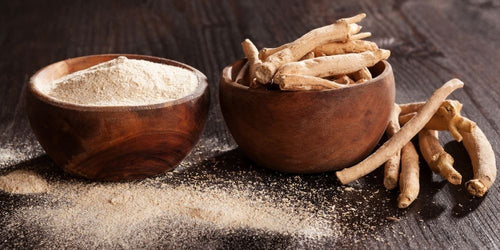Caffeine and its effects
Caffeine is the most widely consumed psychoactive substance in the world (1), widely recognised for its ability to boost alertness and focus (2). So how does it actually work in the brain?
Caffeine works by blocking adenosine receptors - the parts of the brain responsible for making us feel sleepy. In doing so, it increases the activity of neurotransmitters such as dopamine and noradrenaline, which help sharpen mental performance, boost reaction times, and enhance both short-term and long-term memory.
Studies have shown that caffeine can also improve logical reasoning and processing speed, benefits extend beyond simply feeling more alert (3)(4). In fact, caffeine’s role in modulating dopamine is being studied for its potential to support cognitive health in conditions like Parkinson’s disease (PD) (5).
Caffeine offers a helpful mental boost for many, but it’s not without its downsides. Some people may experience increased anxiety, a raised heart rate, disrupted sleep, or withdrawal symptoms like headaches and low energy - especially with regular or high intake (6). That’s why more people are incorporating adaptogens into their daily routine - natural ingredients that help the body adapt to stress - to enjoy the benefits of coffee in a calmer and more balanced way.
What are adaptogens?
Adaptogens are natural compounds found in certain plants and fungi that help the body adapt to physical, mental, and emotional stress. They work by supporting balance in the body’s key systems - especially those involved in the stress response. Although the term “adaptogen” is relatively modern, the concept has been studied for over 50 years (7), with early research describing them as plant-based substances that increase the body’s overall resistance to stress. Adaptogens like Rhodiola rosea, Ashwagandha (Withania somnifera), and Siberian Ginseng (Eleutherococcus senticosus) are known for their rich mix of phytochemicals, which contribute to their stress-regulating and brain-boosting effects.
The synergies between adaptogens and caffeine
There’s growing research into the cognitive benefits of adaptogens (8) - particularly their ability to support memory, focus, and mental clarity. And they synergise well with caffeine.
Although there are many health benefits from coffee, have you ever had a coffee and felt an imbalance - a little jittery, anxious, or on edge? This is because caffeine can increase our cortisol, our stress hormone. We can also experience a spike and then a crash, as caffeine is absorbed quickly - leading many of us to have multiple coffees in a day, which in turn can spike our cortisol further.
How can adaptogens help? They’ve been shown to help regulate our cortisol levels - like a thermostat - allowing us to enjoy coffee whilst staying balanced. By supporting the body’s stress-response system, particularly the hypothalamic-pituitary-adrenal (HPA) axis (9), they help smooth out caffeine’s sharper edges.
Adaptogens can also help smooth out the ‘spike’ and crash phenomenon from coffee, providing more balanced, sustained energy throughout the day without the crash. Many of our customers have gone from drinking 4-5 cups of regular coffee a day to just 1-2 adaptogenic coffees.

Below, we break down how some key adaptogens complement caffeine - and how they can support mental clarity, focus, and resilience when you need it most.
Key adaptogens and their mechanisms of action
Ashwagandha: Calm focus & stress support
When we’re under constant stress - or drinking a lot of caffeine - our cortisol levels (a key stress hormone) can stay elevated. Over time, this can throw off the body’s natural balance, particularly through the HPA axis, which regulates our response to stress (10). Ashwagandha is known for its calming, adaptogenic properties. It helps bring cortisol levels back into balance, especially when they’ve been spiked by caffeine. This not only supports the body’s ability to cope with stress but also helps maintain steady energy and mental clarity throughout the day. Its active compounds, called withanolides, have been shown in studies to reduce anxiety and restore healthy cortisol levels - supporting focus, calm, and cognitive performance (11).
Cordyceps: Natural energy & stamina support
Cordyceps sinensis is a powerful adaptogenic mushroom known for supporting energy at a cellular level. It helps promote ATP production (the body’s main energy source) and improves oxygen utilisation, which can boost stamina and reduce fatigue - both mentally and physically. Cordyceps also contains compounds that may help reduce inflammation and protect kidney function, supporting recovery and balance. When paired with caffeine, it offers a more sustained form of energy and focus - helping you feel energised, without overloading your system (12).
Lion’s Mane: Brain support & mental clarity
Lion’s Mane (Hericium erinaceus) is a functional mushroom known for its powerful neuroprotective effects (13). It contains bioactive compounds called hericenones and erinacines, which can cross the blood-brain barrier and stimulate the production of brain-supporting proteins like BDNF and NGF (14). These proteins play a vital role in neurogenesis (the growth of new brain cells) and neuroplasticity - both essential for memory, learning, and focus. Paired with caffeine, Lion’s Mane helps support a clearer, calmer mind - and taking it regularly has shown long-term benefits to cognitive health (15). It’s a powerful ally for maintaining mental clarity and cognitive health, especially during busy or demanding days.
Rhodiola: Mental stamina & stress resilience
Rhodiola rosea is an adaptogenic root that supports the body’s ability to handle stress while also boosting cognitive and physical performance in a more sustainable way. It works by helping regulate cortisol levels and enhancing the production of ATP (your body’s main energy molecule) (16), especially when stress starts to drain your reserves. When paired with caffeine, Rhodiola can help sharpen focus, maintain stamina, and reduce mental fatigue - supporting steady energy and cognitive endurance without the crash (17).
Siberian Ginseng: Vitality, focus & endurance
Siberian Ginseng (also known as Eleutherococcus senticosus) is a root traditionally used to boost stamina and resilience, both physically and mentally. Its active compounds, called eleutherosides, have been linked to improved memory, attention, and overall cognitive function. These compounds may help reduce the build-up of fatigue-causing byproducts (like lactic acid) and support glucose metabolism, which is essential for sustained brain power (18). When combined with caffeine, Siberian Ginseng can help enhance energy, focus, and mental stamina - making it a powerful addition to your daily routine, especially during busy or demanding periods.
In summary…
Caffeine is a big part of many people’s daily routine - whether it’s your morning coffee ritual, a midday pick-me-up, or a way to get through a busy day. While it can support focus and energy, it doesn’t always leave us feeling our best.
That’s where adaptogens come in. When combined with caffeine, they help create a more balanced, sustained boost - reducing the likelihood of jitters or crashes, and supporting mental clarity, focus, and resilience throughout the day.
Whether you’re working through a long to-do list, heading into an intense meeting, or simply trying to stay sharp and grounded, adaptogenic coffee can help you feel more focused, balanced, and energised.
It’s a simple upgrade to your daily ritual, with powerful benefits for your mind, body, and mood.
Bibliography:
(1) Heckman MA, Weil J, De Mejia EG. Caffeine (1, 3, 7‐trimethylxanthine) in foods: a
comprehensive review on consumption, functionality, safety, and regulatory matters. Journal of food science. 2010 Apr;75(3):R77-87.
(2) Fiani B, Zhu L, Musch BL, Briceno S, Andel R, Sadeq N, Ansari AZ. The neurophysiology of caffeine as a central nervous system stimulant and the resultant effects on cognitive function. Cureus. 2021 May;13(5).
(3) Kamimori GH, McLellan TM, Tate CM, Voss DM, Niro P, Lieberman HR. Caffeine improves reaction time, vigilance and logical reasoning during extended periods with restricted opportunities for sleep. Psychopharmacology. 2015 Jun;232:2031-42.
(4) Repantis D, Bovy L, Ohla K, Kühn S, Dresler M. Cognitive enhancement effects of stimulants: a randomized controlled trial testing methylphenidate, modafinil, and caffeine. Psychopharmacology. 2021 Feb;238:441-51.
(5) Fredholm BB, Chen JF, Chern Y. Impacts of methylxanthines and adenosine receptors on neurodegeneration: human and experimental studies. Methylxanthines. 2011:267-310.
(6) Hughes JR, Higgins ST, Bickel WK, Hunt WK, Fenwick JW, Gulliver SB, Mireault GC. Caffeine self-administration, withdrawal, and adverse effects among coffee drinkers. Archives of general psychiatry. 1991 Jul 1;48(7):611-7.
(7) Brekhman II, Dardymov IV. New substances of plant origin which increase nonspecific resistance. Annual review of pharmacology. 1969 Apr;9(1):419-30.
(8) Boolani A, Fuller DT, Mondal S, Wilkinson T, Darie CC, Gumpricht E. Caffeine-Containing, Adaptogenic-Rich Drink Modulates the Effects of Caffeine on Mental Performance and Cognitive Parameters: A Double-Blinded, Placebo-Controlled, Randomized Trial. Nutrients. 2020; 12(7):1922. https://doi.org/10.3390/nu12071922
(9) Panossian A, Wikman G. Effects of adaptogens on the central nervous system and the molecular mechanisms associated with their stress—protective activity. Pharmaceuticals. 2010 Jan;3(1):188-224.
(10) Marin MF, Lord C, Andrews J, Juster RP, Sindi S, Arsenault-Lapierre G, Fiocco AJ, Lupien SJ. Chronic stress, cognitive functioning and mental health. Neurobiology of learning and memory. 2011 Nov 1;96(4):583-95.
(11) Salve J, Pate S, Debnath K, Langade D, Langade DG. Adaptogenic and anxiolytic effects of ashwagandha root extract in healthy adults: a double-blind, randomized, placebo-controlled clinical study. Cureus. 2019 Dec 25;11(12).
(12) Liu W, Gao Y, Zhou Y, Yu F, Li X, Zhang N. Mechanism of cordyceps sinensis and its extracts in the treatment of diabetic kidney disease: a review. Frontiers in Pharmacology. 2022 May 13;13:881835.
(13) Kushairi N, Phan CW, Sabaratnam V, David P, Naidu M. Lion’s mane mushroom, Hericium erinaceus (Bull.: Fr.) Pers. suppresses H2O2-induced oxidative damage and LPS-induced inflammation in HT22 hippocampal neurons and BV2 microglia. Antioxidants. 2019 Aug;8(8):261.
(14) Mori K, Obara Y, Hirota M, Azumi Y, Kinugasa S, Inatomi S, Nakahata N. Nerve growth factor-inducing activity of Hericium erinaceus in 1321N1 human astrocytoma cells. Biological and Pharmaceutical Bulletin. 2008 Sep 1;31(9):1727-32.
(15) Skaper SD. The biology of neurotrophins, signalling pathways, and functional peptide mimetics of neurotrophins and their receptors. CNS & Neurological Disorders-Drug Targets (Formerly Current Drug Targets-CNS & Neurological Disorders). 2008 Feb 1;7(1):46-62.
(16) Abidov M, Crendal F, Grachev S, Seifulla R, Ziegenfuss T. Effect of extracts from Rhodiola rosea and Rhodiola crenulata (Crassulaceae) roots on ATP content in mitochondria of skeletal muscles. Bulletin of experimental biology and medicine. 2003 Dec;136(6):585-7.
(17) Sharma VK, Sharma A, Verma KK, Gaur PK, Kaushik R, Abdali B. A comprehensive review on pharmacological potentials of caffeine. Journal of Applied Pharmaceutical Sciences and Research. 2023 Dec 14;6(3):16-26.
(18) Huang L, Zhao H, Huang B, Zheng C, Peng W, Qin L. Acanthopanax senticosus: review of botany, chemistry and pharmacology. Die Pharmazie-An International Journal of Pharmaceutical Sciences. 2011 Feb 10;66(2):83-97.























